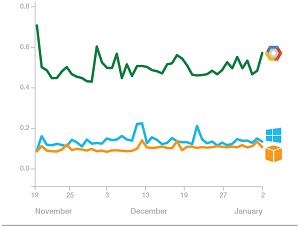News
Azure Edges Amazon in Cloud Storage Testing
Microsoft Azure Blob Storage edged out Amazon Simple Storage Service (Amazon S3) in performance testing conducted by enterprise cloud storage company Nasuni Corp.
Nasuni has been testing cloud storage services since December 2011 and producing biennial reports detailing write/read/delete speeds, availability and scalability.
The latest State of Cloud Storage Report shows Azure came out on top overall, though Amazon S3 did best its Redmond rival in some significant metrics.
"Microsoft has made enormous strides with its cloud storage service since Nasuni issued its first cloud storage provider (CSP) report in December 2011," the company said this week in a news release. "In that report, though Microsoft performed well, Amazon was clearly superior. That changed in the February 2013 CSP report when Microsoft took the top spot over Amazon. The 2015 CSP report shows that Microsoft has managed to hold on to its position as the top cloud storage performer."
Even though it was just limited to storage, the study reaffirms several other general cloud computing studies that show Amazon Web Services Inc. (AWS) is maintaining its formidable market leadership position, though Microsoft Azure is making gains in some areas and is generally seen as the strongest challenger.
Among such challengers, Google Cloud Storage was a distant third in the new Nasuni testing. The company said it had planned to also test HP's Cloud Object Storage and IBM's SoftLayer but various problems prevented that.
 [Click on image for larger view.]
Average Daily Response Time (source: Nasuni Corp.)
[Click on image for larger view.]
Average Daily Response Time (source: Nasuni Corp.)
Nasuni said it tests the cloud storage providers for its own use but shares the information it gathers. It treats public cloud storage providers as commodity resources for its Cloud NAS service and likens its cloud storage testing to the way storage companies test commodity disk drives.
In specific metrics, Nasuni found that Azure Blob Storage came out on top in write speed in most measurements, though Amazon S3 performed better handling files larger than 1 MB. Azure also led in read speeds, but by less of a margin. In deletion tests, Microsoft was the overwhelming leader.
Amazon had a tiny edge in availability and posted better response times.
For scalability, Nasuni said it tested the variance of write speed in writing 100 million objects, the number of write misses and read misses and the tradeoff between variance and write speed.
"Microsoft had, by far, the largest write variance, which was more than 130 times larger than Google's, who had the smallest variance," Nasuni said. "Read and write errors were almost non-existent. Only Amazon showed any misses at all: five write errors over 100 million objects, which gives an error rate of .00005 percent."
"Microsoft's continued investment in its second-generation cloud storage platform continues to pay off," said Andres Rodriguez, CEO of Nasuni. "Nevertheless, Amazon S3 was not very far behind Microsoft, and even bested Microsoft in some areas, such as write speed for large files. With Amazon and Microsoft, enterprise IT has two mature, robust CSPs whose platforms will eventually replace the spinning disk within the enterprise datacenter."
About the Author
David Ramel is an editor and writer at Converge 360.